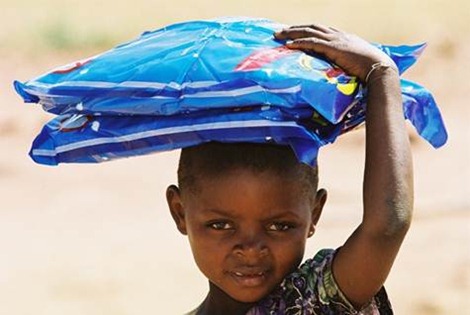A Helping Hand in Malawi
John Nielsen, General Manager, Europe, Middle East and Africa Customer Service and Support at Microsoft and Paul Norris, General Manager, Europe, Middle East and Africa Premier Field Engineering at Microsoft
Have you ever welcomed an open window on a warm summer night? Unfortunately, the seemingly simple pleasure of an open window to feel the night’s breeze can facilitate a potential death threat for people in mosquito-infested Malawi -due to malaria. Every year, 250 million people are infected with malaria, and one million die. Most of these tragic deaths occur among children younger than five years old. Did you have any idea that so many children die in Africa of malaria each day, the number rivals that of seven sold-out jumbo jets?
While the delivery of anti-malarial drugs is challenging due to numerous factors- an 80 percent reduction in mortality rates can be facilitated by using physical barriers – such as mosquito nets – that cost less than $5 each to make.
These staggering statistics caught the eye of a team from Microsoft Services in Europe, Middle East and Africa (EMEA) who decided to use its skills and technology to help young people in Malawi forge a healthy and successful future.
The group’s work to help improve lives in Africa and address the most difficult societal issues through technology began with projects in Mali and Madagascar in 2009. This year, the focus is on addressing the most pressing public health concern facing people in sub-Saharan Africa: malaria. This initiative is calling upon the skills and passion of our people to help the children of Malawi stay healthy, learn and thrive.
So what is the plan?
- Currently we are driving internal fundraising efforts to provide 5,000 mosquito nets to Malawian families, and are working with the Against Malaria Foundation, a UK-based organization which is the #1 anti-malaria net charity globally, according to Givewell .
- A technical team will be travelling to Malawi in early September 2011- To initiate a project utilizing ten engineers who will refurbish four schools’ IT labs -networking these schools together. Another two schools will join over a wireless network provided by Access Communications, a local mobile phone provider, allowing for student collaboration using, initially, Microsoft SharePoint and Microsoft Exchange.
- Microsoft teams will work with teachers to train them on the use of these tools to ensure students reap the greatest educational benefit, and using technology to share vital information about the transmission and prevention of diseases.
- The team will lead events designed to encourage prosperity and development including: There will be a DigiGirlz event for female students, designed to provide them with a better understanding of the career opportunities available in the technology sector–as well as an evening with local business leaders and students to talk about Microsoft’s work in Africa and our project in Malawi.
- At Microsoft’s headquarters in the United States a team has a drive under way to collect as many USB sticks as possible. These will prove invaluable to local schools, allowing them to work on much larger and more complex projects which typically have far larger file sizes.
And the work doesn’t stop when our team returns home or when the mosquito nets are in place. Microsoft is forming a Technology Mentoring Network with the people of Malawi that will offer ongoing support and training to young Malawians in their final year of school.
We’re incredibly proud of this opportunity to use our team’s resources and expertise to work closely with an incredible local community.
To find out how you can get involved, please click here.
